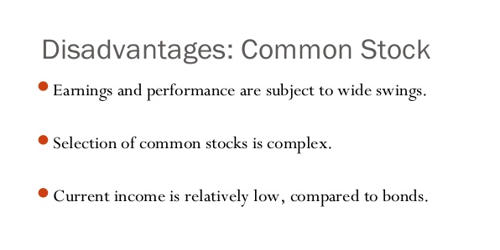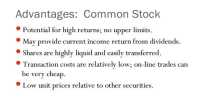Disadvantages of Common Stock
Common stock is a form of corporate equity ownership, a type of security. Common stock owners can profit from the capital appreciation of the securities. Common stocks allow stockholders to vote on corporate issues, such as the board of directors and accepting takeover bids. They allow you to own a portion of the company without taking possession. Most of the time, stockholders receive one vote per share.
List of Disadvantages of Common Stocks
- You don’t have much control over your investment.
Although you may get awarded with voting rights when purchasing common stocks, it is often difficult or impossible to exercise any control over this investment. If you were to put that money into a company that you control, then your decisions on strategies and best practices can lead to a profitable experience.
- High-risk investment.
Risks are always associated with investing, but more of these are linked to common stocks. Their prices are volatile, fluctuating erratically. If you panic every time the price goes down and sells your stocks, you could end up losing more. The value of the stocks can also change without warning, making it difficult to evaluate their performance even if the company is doing well.
- Companies are not required to pay dividends on common stocks.
Although some organizations regularly pay dividends on common stocks and have done so for decades, there is no obligation for a company to take this action. The downside risks are very high, which is my mutual funds are often a priority when investors first start to trade.
- Lack of control.
Buying stocks from a company is a tricky situation. Your success practically depends on whether or not a business has excellent practices and strategies. As a shareholder, you are also subject to the will of stockholders. This is why it is vital that you perform due diligence before you invest.
- You will face high levels of professional competition when investing in common stocks.
Professional traders and institutional investors have more time to monitor the stock market and research companies. That means their work has a competitive edge against your investing efforts if you don’t have the same amount of time available. These folks have access to sophisticated trading tools and financial models that reduce their risk factors when making and investing decision.
- Last one to get paid.
This is probably the biggest downside of common stocks. As previously mentioned, if a company liquidates, you would not get paid until those that rank high on the priority ladder gets their share. Good enough if you get to pull out your stocks just in time. But because stocks don’t always behave as consistently, anticipating its performance would be difficult.
- You are the last person to get paid during company liquidation.
If the organization goes into liquidation and you hold common stocks, then you are going to be the last person who gets paid. Most shareholders that use this investing option rarely see any of their money come back in that situation.
















